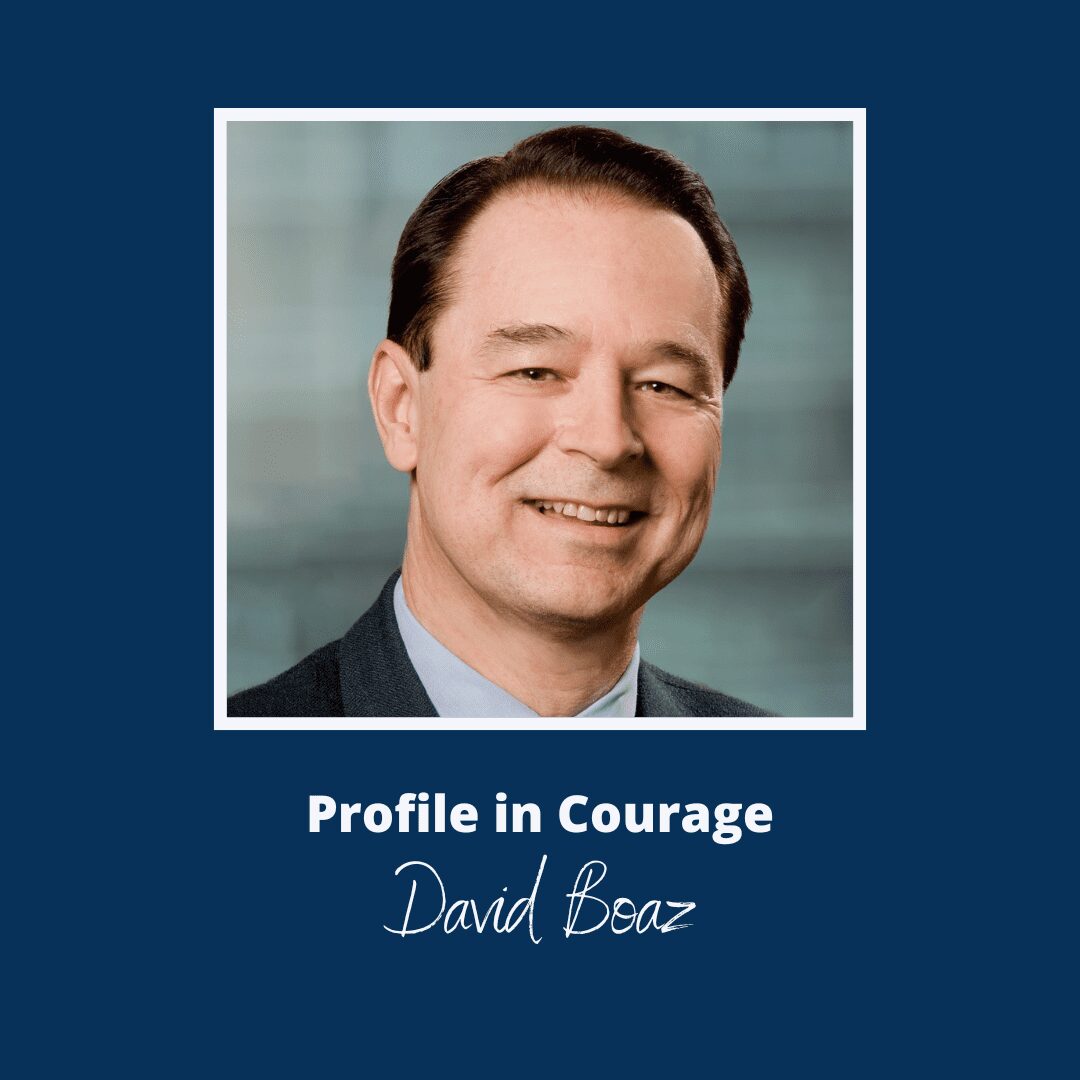
Profile in Courage: David Boaz
David Williams
June 28, 2024
Thoughtfulness and reasoned discussion have all-but-vanished inside the Beltway. The prevailing punditry prefers quick quips, personal attacks, and groupthink to reasoned debate and thoughtful inquiry. Recently deceased libertarian thinker David Boaz avoided this dangerous game at all costs and made the case for a free society with a rare combination of grace and sophistication. As Boaz’s former colleague Ryan Bourne notes, Boaz made sure that scholars under his helm were, “not being unnecessarily rude or attacking the motives of politicians in public…[he] thought that for libertarian ideas to be taken seriously, they needed to be presented in a way that people…would take seriously too.” For taking the high road, sticking to his principles, and enamoring a generation to the ideas of liberty, David Boaz is absolutely a Profile in Courage.
From the cradle, Boaz received a healthy helping of politics. His father was a judge serving on the Court of Appeals of Kentucky and a “Jeffersonian conservative Democrat.” His uncle (Frank Albert Stubblefield) served eight terms as a Democratic congressman from Kentucky and worked on the Kentucky Railroad Commission. If this family background was any guide, Boaz was bound for establishment politics as a lawmaker or judge. Like many young conservative politicos, he found common cause with an advocacy organization called Young Americans for Freedom (YAF) and served various roles within the group. In a recent interview with Reason Magazine editor Nick Gillespie, Boaz recalled that he was a staunch Republican during his time at YAF and went to the GOP’s 1976 national convention. But, all that changed in 1978 when he “got hired to work on the Clark for Governor campaign, and that shifted my allegiance. Ed Clark for governor, California 1978—the first big Libertarian Party campaign that actually had some money and a professional staff of me and one other guy.” Getting involved in libertarian politics gave Boaz a focal point outside of mainstream politics, and he started to see how the rhetoric of politicians on both sides of the aisle didn’t match up with their actual policy positions.
Despite some successes, state-based political campaigns offered limited recourse for young activists such as Boaz who were fed-up with the national political status-quo. In Washington, D.C., conservative, moderate, and liberal points-of-view were well represented by think-tanks such as the American Enterprise Institute and the Brookings Institution. There was no corresponding home for limited government advocates, but libertarian activist Ed Crane was determined to change that. Crane opened the Cato Institute in 1977, and, four years later, successfully persuaded Boaz to join him at the new think-tank.
Boaz spent the remainder of his career at Cato, advancing the cause of liberty through publications, op-eds, media appearances, and debates well-attended by interns and congressional staffers. And, unlike most heavyweights in Washington, D.C., Boaz had a reputation for being accessible and open to chatting with anyone. Cato’s vice president for development Harrison Moar remembers, “Whether it was his fantastic staff writers or a visiting freedom fighter from Africa, David always sat down with anyone who wanted to talk—or those who were made to speak to him. Staff would pile up outside my office waiting for David—some to answer a ‘Boaz Knows’ message, no doubt, and I could see the fear in their eyes. Yet he always seemed ready to engage the next person charitably. David was generous with his time, which he spent pursuing truth, knowledge, and liberty.” Even when he didn’t have the opportunity to speak with them,
Boaz made a difference in the lives of countless people who read his many works. Cato scholar Aaron Ross Powell recently observed, “when I wrote a tribute to him while he was still alive, my inbox filled with messages from others who encountered David’s work when they were young too, and who told me how he shaped their political and intellectual perspective. A generation of principled advocates for genuine liberalism exists because of David Boaz, and more are discovering his writing every day.”
David Boaz may no longer be with us, but he lives on through all the warm memories and his Grade-A scholarship and advocacy. Boaz was a once-in-a-generation champion for a better world, and he will be missed dearly.
